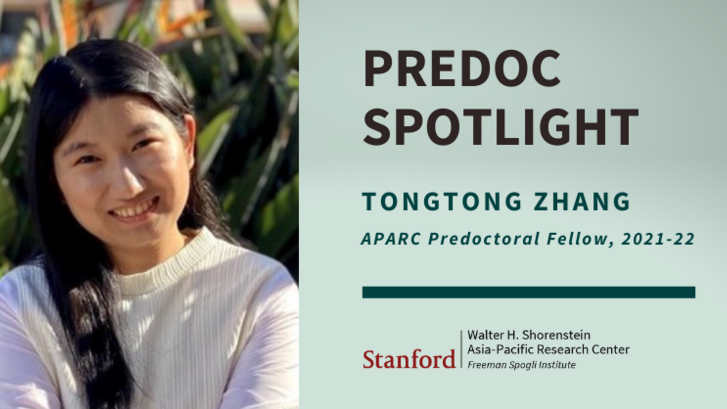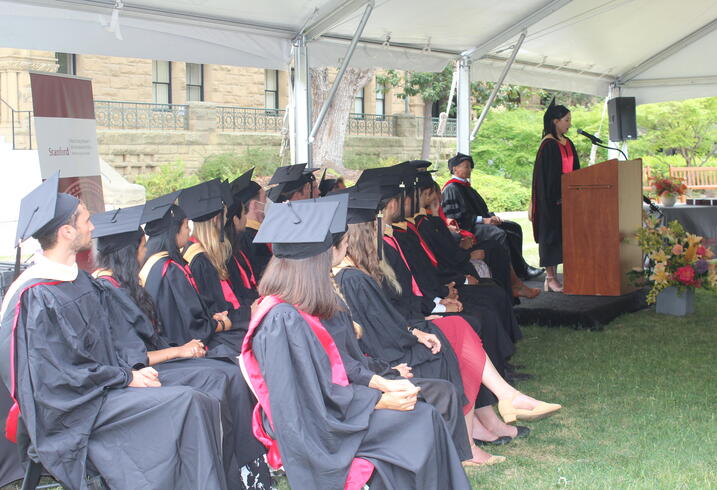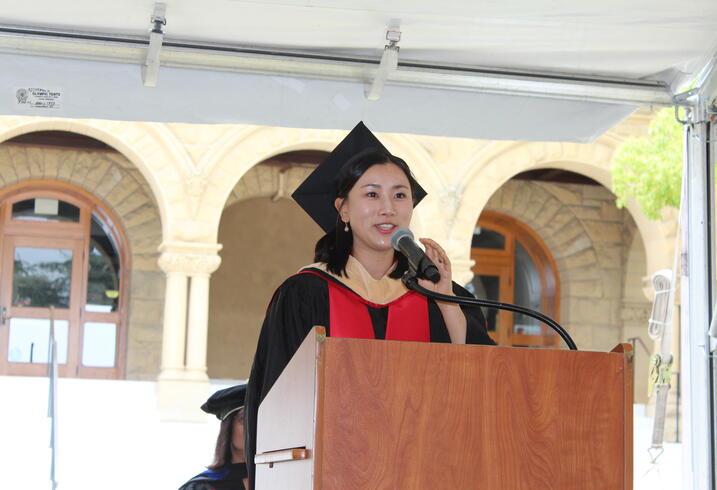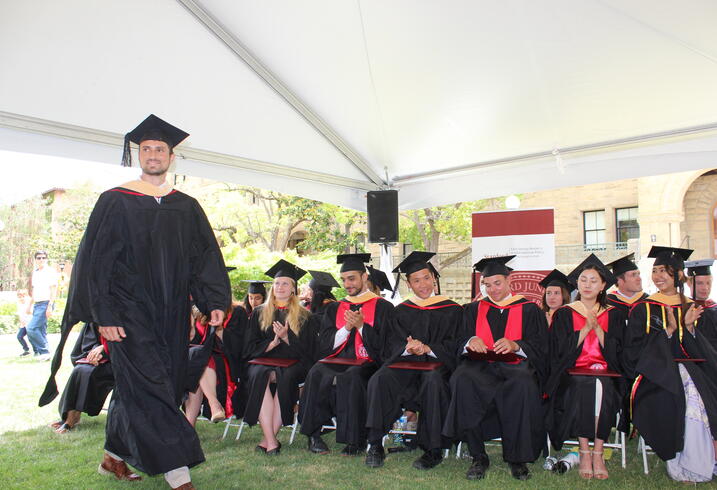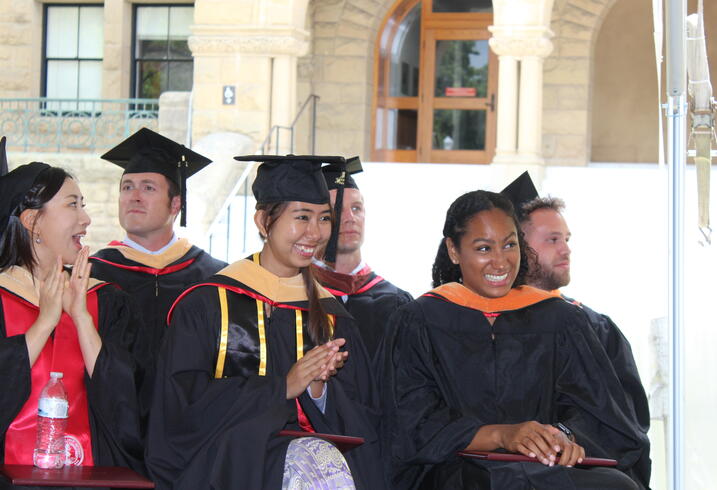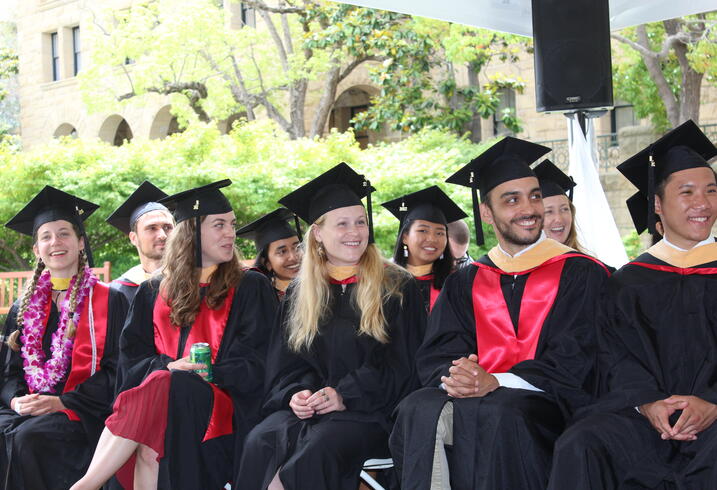Why Korea’s Future Depends on Its Universities
This essay originally appeared in Korean on September 30 in Sindonga (New East Asia), Korea’s oldest monthly magazine (established 1931), as part of a monthly column, "Shin’s Reflections on Korea." Translated by Raymond Ha. A PDF version of this essay is also available to download.
It is still the age of America. The Cold War ended with the collapse of the Soviet Union, and Japan failed to overtake the United States in the 1980s. China is now chasing the United States at a blistering pace, but it is still falling short. What are the sources of America’s power?
The first is technological innovation, epitomized by the world-leading companies of Silicon Valley. Intel, Apple, Google, Facebook, Uber, Tesla, Twitter, and many other U.S. businesses have built global platforms in their respective sectors.
The second is military power. As of this year, the U.S. defense budget exceeds $750 billion. This is over three times as large as that of China ($237 billion), which has the second largest national defense budget. Moreover, the United States has the most military allies of any country, and its troops are deployed in every corner of the globe. Although Beijing and Washington are now economic competitors, China has a long way to go in the military domain.
The third is America’s universities. There are approximately 4,000 universities in the United States, including around half of the top 100 universities in the world. America’s universities are incubators for global talent. They host over a million foreign students. This is roughly twice that of the United Kingdom and Canada, which rank second and third in terms of foreign student populations.
Although these three interconnected factors underpin America’s global influence, universities lie at the core of American power. It is widely known that tech giants such as HP, Google, Facebook, and Yahoo have their roots in universities. Silicon Valley would not exist without Stanford or UC Berkeley. These two institutions are successful case studies in how academia can partner with industry. Stanford alumni have created countless companies, and Berkeley is the largest source of scientists and engineers for Silicon Valley.
The Pentagon annually dedicates roughly $1 billion toward funding basic research at universities. Technologies that are initially developed for military purposes are sometimes commercialized. A well-known example is the Global Positioning System (GPS), which was developed by the Department of Defense in 1973. After Korean Air Lines flight 007 was shot down by a Soviet fighter plane in 1983, President Reagan approved the use of GPS for commercial purposes.
There is fluid cooperation between the U.S. government, industry, and academia. Universities are at the heart of this trilateral partnership. Moreover, universities are becoming Americanized not only in Asia, but also in Europe, where many schools boast a long and proud history. More and more lectures are taught in English, and there is an emphasis on collaborating with the private sector.
What, then, explains the power and influence of America’s universities? In this essay, I seek to answer this question based on my experiences during the 30 years I have spent as a professor in the United States. I also consider how this might inform the future of Korea’s universities, which are losing their vitality. Demographic changes have already begun to reduce student enrollment in Korea, and many schools face an increasingly bleak financial situation. Moreover, the regional imbalance between schools in and outside the Seoul metropolitan area continues to deepen.[1] Whether Korea’s universities can overcome these pressing challenges will have critical implications for the country’s future. The Yoon Suk-yeol administration has vowed to pursue reforms in three areas: labor policy, pensions, and education. It is thus timely and important to examine how the educational policies of other countries could inform Korea’s own policies.
Promoting Coexistence and Cooperation
Whether it is in politics, economics, society, or culture, the health and effectiveness of any institution depends on the nature of the ecosystem that surrounds it. An institution cannot persist unless it promotes coexistence and facilitates fluid cooperation between its constituent members.
Let us begin by surveying the overall landscape of America’s higher education ecosystem. According to statistics from 2019, there are roughly 4,000 universities in the United States. About half are private institutions, and the other half consist of public universities that are associated with states or cities. Some schools have four-year programs, while others offer two-year degrees. Large research universities focus on research and training PhD students, whereas liberal arts schools tend to be smaller and dedicate resources to undergraduates. There are also community colleges that are open to anyone with a high school diploma. Although a minority, there are also for-profit colleges and universities, as well as those that only offer online classes.[2]
To ground the discussion, let us focus on the state of California, where I currently live. Its population of 40 million is slightly smaller than that of Korea, but its economy is about 1.7 times larger. There are large private universities such as Stanford and USC, as well as renowned liberal arts schools, such as Pomona College. California arguably maintains the most robust system of public universities in the United States.
California’s public schools consist of the University of California (UC), California State University (CSU), and community colleges. The UC system consists of 10 campuses, including those in Berkeley, Los Angeles, and San Diego, with a total enrollment of around 300,000. For California residents, the annual tuition fee is roughly $14,000 (as of 2022). This is much more affordable than private universities, which commonly charge upwards of $60,000. UC schools not only have highly regarded undergraduate programs, but also run reputable graduate programs and generate substantial research output.
The CSU system consists of 500,000 students across 23 campuses. There are many minority students, including Hispanic and Latino Americans. Admission is less competitive than at UC schools, with an admission rate of around 80%. Tuition fees are also cheaper, at $6,000 per year. There are many part-time students and faculty, and it typically takes six to eight years to graduate. CSU schools offer highly specialized programs. For example, over half of California’s certified schoolteachers are CSU graduates.
Lastly, California has 116 community colleges that offer two-year degrees. Tuition fees are only $2,000 a year. Classes are open to anyone with a high school diploma (or equivalent), and there are a total of 2.1 million students. Most importantly, the UC system, CSU schools, and community colleges maintain close relationships with each other. By doing so, they uphold a robust system of public schools in California.
Transfer Students: Providing a Second Chance
UC schools are popular among prospective students and have low admission rates. However, only two-thirds of admitted students are high school graduates. The remaining third are transfer students, most of whom are community college graduates. According to data published by UCLA for 2021, 6,585 incoming students came directly from high school. There were 3,436 transfer students, and 93% of them had graduated from community colleges.
Furthermore, 44% of UCLA’s transfer students in 2021 were the first in their families to attend college. 36% were from ethnic minorities, and 72% received financial aid. The admission rate for transfer students was 19%, which was higher than the 11% admission rate for high school seniors. This is typical of schools in the UC system. If transferring to a UC school is difficult, students opt to transfer into a CSU school instead. For students who cannot immediately attend a four-year college after high school due to financial considerations or other personal circumstances, transfer applications offer a valuable second chance.
In this way, UC schools, CSU schools, and community colleges complement each other to sustain a stable ecosystem of public universities in California. This stands in stark contrast to Korea, where schools in the Seoul metropolitan area engage in a zero-sum competition with schools in other regions. Moreover, it is common for students in Korea to retake the College Scholastic Ability Test (CSAT) multiple times in the hopes of obtaining a better score to attend a highly ranked university.[3] After graduating high school, these students dedicate at least a year studying for the CSAT. The college one attends has an outsized impact on future job prospects and social standing in Korea, and there are no other pathways available.
How might we revitalize Korea’s universities? One way is to implement structural reforms among public universities such that a quarter of Seoul National University’s (SNU) admissions quota is allocated to transfer students from public schools in other regions.[4] In turn, public universities outside of Seoul could allocate a quarter of their admission quotas to students from professional schools that offer two- or three-year degrees.[5] Creating these pathways could allow SNU, regional public universities, and professional schools to form a more fluid, cooperative ecosystem of higher education. Some may respond that the differences in academic standards and expectations between SNU and regional public universities are too large to make this feasible. However, it is not uncommon to see transfer students from community colleges excel at schools with rigorous academics, such as UC Berkeley or UCLA. In fact, the graduation rate is higher among transfer students (88%) than those who entered as freshmen (84%).
By creating such pathways between different elements of the higher education ecosystem, it will be possible to ease the pressure on students. They will have alternatives to retaking the CSAT. Enabling the opportunity to transfer into different schools will also ease social inequalities. If they are willing, students at professional schools will be able to pursue further studies at regional public universities. In turn, students at these public universities will have the chance to study at SNU. This will help loosen the rigid vertical hierarchy among Korea’s universities and enhance diversity in higher education.
Why a Perfect SAT Score is Not Enough
Even carefully crafted institutions cannot fully realize their intended effects without the right people. Colleges and universities in the United States apply a variety of standards to select the faculty and students who make up the academic community.
At comprehensive research universities like Stanford or UCLA, faculty are evaluated primarily by their research output. The expression “publish or perish” reflects this reality. On the other hand, liberal arts colleges value teaching and mentoring as much as research. For faculty at community colleges, there is an emphasis on training and preparing students to successfully transfer into four-year colleges.
In the United States, the tenure system is the cornerstone of academia. Unless they are implicated in criminal activities, tenured professors can teach for as long as they want. (In Korea, tenured professors must retire by the age of 65.) Although the tenure system ensures job security, its primary purpose is to protect academic freedom. It enables professors to freely explore and debate ideas regardless of external circumstances, including the political atmosphere. This privilege is granted only after a rigorous evaluation. The most important factor in this process, which usually takes a year to complete, is the candidate’s academic caliber. The assessment is relatively objective, as it involves 12 or more outside experts.
Those who are denied tenure are given one year to find a position at a different school. If their research output is held in high regard, it is possible to transfer to a more prestigious institution. There is a fierce competition between schools to attract talented professors. Even if professors are denied tenure and move to a lower-ranked university, they can work to enhance their research portfolio to transfer to another university later on. In other words, the academic job market is much more flexible than that of Korea. I began my academic career at the University of Iowa, where I taught for three years. I then taught at UCLA for seven years before moving to Stanford in 2001. It is very rare for professors to move between three schools in Korea.
The selection of students is just as important as the hiring of faculty. Prestigious schools in the United States, including Stanford, do not admit students solely on the basis of academic excellence. Admissions offices use grades and SAT scores to assess an applicant’s academic ability, but these numbers alone do not guarantee admission. It is certainly not unheard of for straight-A students with multiple AP exams and a perfect SAT score under their belts to be denied admission. In recent years, colleges and universities have begun to phase out standardized test scores from the admissions process. UC schools have announced that they will be dropping the requirement altogether.
More than Just Academics
Colleges and universities in the United States vary considerably in their size, character, and founding mission. Schools thus apply a variety of criteria in the admissions process. In general, more reputable universities tend to admit students with a view to nurturing individuals who will make important contributions to American society and the world. Along these lines, the two decisive factors in evaluating applicants are leadership and commitment.
Leadership requires a sense of responsibility toward one’s community. It begins from a willingness to serve others and prioritize their needs above one’s own. The notion of commitment cannot be easily translated into Korean, but it refers to a persistent dedication to an area that one is passionate about, whether it is an academic subject, athletics, music, or community service.
In Korea, students spend an enormous amount of time and resources to build up their resume. This is colloquially referred to as “building up one’s spec,” which is short for specification. Students with extensive qualifications and experiences may appear brilliant on the surface, but it is hard to tell whether they have a sincere passion for any subject or activity at all. Just like the students and parents portrayed in the popular drama “SKY Castle,” an impressive resume may be nothing more than an exquisite mirage.[6] Colleges in the United States tend to seek out students who have shown a steadfast commitment to an activity or issue, more so than students with the most impressive academic credentials.
American universities also emphasize diversity when admitting students. At Stanford, students from ethnic minorities make up over half the student body. The gender distribution is also balanced, with 49% male students and 51% female students. As I mentioned in my previous column about diversity, schools in the United States place a high value on diversity when selecting students and faculty, even though they do not apply affirmative action policies.[7] Accordingly, applicants must be able to demonstrate how they can make a unique contribution to the academic community, instead of striving to meet a uniform standard based only on grades and test scores.
For students, life on campus is not confined to the classroom. It is not necessary to select only those students with the highest grades. Universities should be a place for cultivating leaders who not only possess a sense of responsibility toward their community, but also fulfill necessary roles in society. When students from varied backgrounds and diverse interests come together, they will spark each other’s curiosity. It is not a coincidence that the founders of companies like Google or Yahoo formulated innovative ideas while they were students at Stanford. In this way, admissions policies can directly influence a school’s atmosphere.
Korea should also give serious thought to how it can prepare and nurture students for the 21st century, so that they can contribute to Korea and the global community. The Yoon administration’s education policies must incorporate measures to achieve this goal.
Meeting Social and Economic Demands
Universities do not exist in a vacuum. They should not be an ivory tower, detached from the rest of society. Rather, they must play a proactive role in tackling important social and economic problems.
Frederick Terman, who served as a professor of engineering and provost at Stanford, was a pioneer of academia-industry collaboration. He is widely known in Korea for his role in establishing the Korea Advanced Institute of Science and Technology (KAIST), which is one of the country’s most prestigious science and engineering schools. Terman also played a central role in the 1951 creation of Stanford Industrial Park, which hosted high-tech firms. He was a visionary who encouraged students to create companies. Since then, Stanford graduates have established 40,000 companies. Terman is widely regarded as the “father of Silicon Valley.” Such momentous developments were possible because Terman, as an academic administrator, positioned Stanford to directly contribute to emerging social and economic trends. Stanford has played a leading role in major technological developments for many decades, from semiconductors to the IT boom and now artificial intelligence.
This year, Stanford launched the Doerr College of Sustainability. It was the first time in 70 years that Stanford established a new school. This is an intriguing development, since schools within universities typically focus on professional fields—engineering, medicine, or business—instead of addressing specific issues that may not be well known to the general public. By creating this new school, Stanford seeks to play a leading role in researching and devising solutions to two critical challenges that humanity will face in the coming decades: climate change and the energy crisis. In addition to drawing on existing faculty from other departments, Stanford plans to hire 60 new faculty members, with the goal of connecting scientific research to policy issues.
A $1.1 billion donation from Ann and John Doerr, one of Silicon Valley’s most successful venture capitalists, was crucial to the school’s establishment. Gifts from other donors brought the total to $1.69 billion. As in this case, outside donations often enable America’s universities to prepare for the future. Private institutions such as Harvard ($53.2 billion) and Stanford ($37.8 billion) have sizable endowments. Public schools are no exception. The University of Texas system has an endowment of $42.1 billion dollars, and the UC system has $12.1 billion. Universities rely on these resources for their long-term development.
In Korea, these donations are commonly misunderstood as payments to secure admissions. It is true that private universities have legacy admissions to account for familial ties or recognize those who have contributed to the school’s development. However, it is difficult to imagine students being accepted only because of donations. In fact, there have been several cases in recent years where parents who engaged in these practices were found criminally responsible. The students also had their admissions revoked.
As is the case with the Doerrs, colleges and universities in the United States use outside donations to address future challenges and support pioneering research. Furthermore, donations allow schools to hire talented professors and provide financial assistance to students from low-income households. At Stanford, families with an annual income below $75,000 do not have to pay tuition, room or board. At UCLA, around 45% of all students are exempt from paying tuition. Schools in the U.S. offer merit-based scholarships as well, but need-based scholarships are far more common. There are policies to help ease the financial burden for those who seek to pursue a college degree. In the bigger picture, donations to universities are a form of redistribution. To incentivize such donations, individuals are allowed to claim tax deductions for donations to non-profit educational institutions.
Korea’s universities face a difficult financial situation. Both tuition fees and professors’ salaries have been frozen for a decade. Donations from individuals and companies are negligible. Stanford and SNU have roughly the same number of faculty, but Stanford’s annual operating budget ($8.2 billion) is many times larger than that of SNU ($1.1 billion). Korea’s Ministry of Education allocates 12 trillion won ($8.3 billion) in its budget toward universities. This is only one-sixth of the ministry’s budget for preschool and elementary school, and is the lowest among OECD countries.
Universities cannot play a proactive role in addressing economic and social challenges unless they are financially stable. The Korean government must provide greater resources to universities, while also giving them more latitude. There should be incentives for individuals and companies to donate to universities with an eye to the future. At the same time, universities must maintain a sense of social responsibility and be faithful to their role in leading the way toward the future.
The Perils of Short-term Governance
The last issue is internal governance. Compared to Korea, administrative leaders at American universities stay in office for a much longer duration. This yields greater continuity. Charles Young, who served as chancellor when I was at UCLA, led the university for 29 years. John Hennessy, who was Stanford’s president when I arrived in 2001, served in that position for 16 years. Deans also typically serve for many years. In my case, I have been the director of the Shorenstein Asia-Pacific Research Center (APARC) at Stanford since 2005.
The governance of U.S. colleges is decentralized to a significant degree, compared with Korean universities. There are specific matters that require the dean’s approval, such as hiring decisions for faculty. Some issues require the assistance of legal counsel. By contrast, in Korea, most issues must be reviewed by the university’s administrative headquarters, which reports to the president. For example, suppose that Shorenstein APARC pursues a partnership with a research center at a Korean university. Issues that I can directly approve as APARC’s director often require the approval of administrative headquarters on the Korean side.
Although the governance of American universities is decentralized, faculty members must work within strictly prescribed boundaries. At Stanford, professors have to submit two documents to the university every May. (There are similar procedures at other schools.) Faculty members have to declare whether there were any conflicts of commitment over the past year, as well as any conflicts of interest.
Several years ago, a Korean university approached me to offer a position as an adjunct professor. It seemed like a promising opportunity. I asked the Stanford administration whether this arrangement would be possible, but I was told that there would be a conflict of commitment. I had no choice but to respectfully decline the offer. Stanford allows its faculty to spend 52 days a year on external activities, including consulting. However, any activities that seriously impede the ability to fulfill one’s basic duties as a Stanford professor are strictly regulated, as they are considered to create a conflict of commitment.
The same is true for conflicts of interest. Professors who wish to participate in external projects must adhere to detailed regulations to avoid conflicts of interest. There are also measures to protect the school’s reputation. For example, Stanford’s logo or name cannot be used in external consulting projects. Moreover, Stanford faculty cannot take on positions with decision-making authority, such as director or manager, while taking part in these projects.
Korea’s universities could also consider institutionalizing strict rules for professors’ activities, allowing for freedom within these boundaries. In Korea, there are frequent controversies about so-called “polifessors,” or professors who engage in political activities. Questions often arise about the appropriate scope of external activities for professors. It may be helpful to examine these issues from the perspective of conflict of commitment and conflict of interest.
As is the case with Korea’s politics, university presidents only serve for a short period of time. This undermines continuity in leadership. Most university presidents in Korea serve one four-year term, with no possibility of a second term, regardless of their performance. Deans and other administrative positions also only last between two and four years. It is thus difficult to create and implement long-term, future-oriented plans. Instead, there is a narrow focus on achieving short-term goals. When a new president takes the helm, he or she tends to break from the predecessor’s policies.
These structural issues are inextricably tied to the direct election of university presidents. In many Korean universities, faculty members vote for the university president. This would be unimaginable in the United States, where schools usually form a search committee consisting of professors, members of the board of trustees, and alumni. After thoroughly evaluating and considering candidates for at least several months, this committee selects the next president. Given the rigorous nature of this process, presidents typically serve for many years as long as there are no serious concerns about their performance. The direct election of university presidents was a natural and legitimate outgrowth of Korea’s democratization, but it has created serious side effects, including the politicization of the academy. It is time to reform the governance structures of Korea’s universities.
The Driving Force of a Global Superpower
There continue to be debates about the decline of American power, but the United States still remains a global hegemon. Its ability to lead and influence the world arises in no small part from its universities, which are the source of America’s technological innovation and its military and economic heft. Korea’s dramatic transformation over the past 70 years was also driven by an intense focus on education, giving rise to a highly skilled and educated population.
Today, Korea’s universities face a serious crisis. There are severe regional imbalances between schools in the Seoul metropolitan area and other parts of the country. Universities lack the financial resources to create and implement long-term plans. Furthermore, the governance of Korea’s universities has become excessively politicized. For Korea to leap into the future, its universities need to be revitalized. As it pursues educational reforms, the Yoon administration must remember that the country’s future depends on its universities.
[1] The Seoul metropolitan area is often considered to include Incheon and Gyeonggi Province, as well as Seoul proper. These areas are connected to Seoul by rapid transit.
[2] National Center for Education Statistics, table 317.10, “Degree-granting Postsecondary Institutions, by Control and Level of Institution: Selected Years, 1949-50 through 2019-20,” https://nces.ed.gov/programs/digest/d20/tables/dt20_317.10.asp?current=yes.
[3] The CSAT, commonly known as su-neung, is a nationwide exam that is administered once a year. The test is taken by high school seniors, as well as high school graduates seeking to obtain a better score. One’s CSAT score has a decisive impact on prospects for college admissions. For a brief overview of su-neung, see “Suneung: The day silence falls over South Korea,” BBC News, November 26, 2018, https://www.bbc.com/news/world-asia-46181240.
[4] Seoul National University is widely regarded as the most prestigious university in Korea.
[5] These professional schools are also referred to as junior colleges. For a more detailed explanation, see “Higher Education in Korea,” Study in Korea, https://www.studyinkorea.go.kr/en/overseas_info/allnew_higherEducation.do.
[6] This drama, which aired from 2018 to 2019, portrays the cutthroat competition between parents in upper-class households to send their children to Seoul National University. The title is a play on a widely used acronym for the three most prestigious universities in Korea: Seoul National University, Korea University, and Yonsei University, which are collectively referred to as the “SKY” universities.
[7] Gi-Wook Shin, “Beyond Representation: How Diversity Can Unleash Korea’s Innovation,” June 30, 2022, https://aparc.fsi.stanford.edu/news/beyond-representation-how-diversity-can-unleash-korea%E2%80%99s-innovation.
DOWNLOAD A PDF VERSION OF THIS ESSAY
Read More
Lessons from the United States









